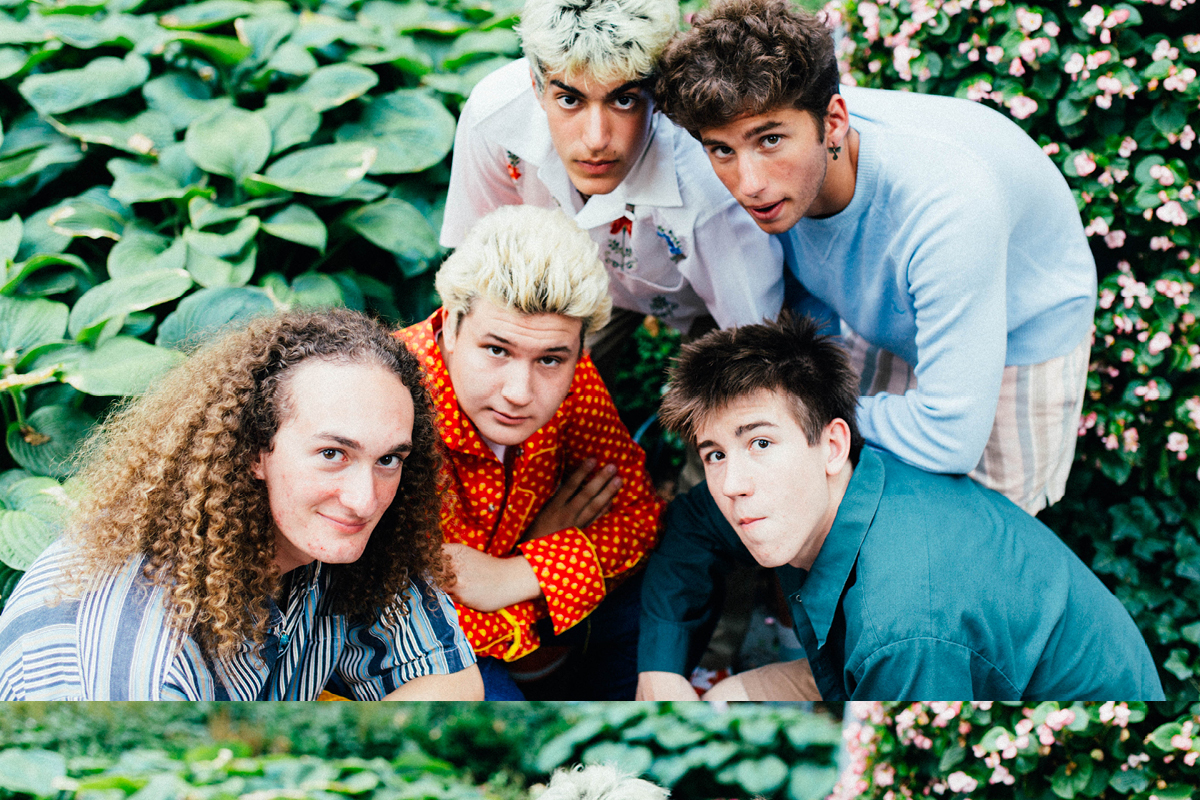
LAUNDRY DAY are wrapping up their band practice on a hot summer’s afternoon in Midtown Manhattan, just a few days before they hit the road on their eleven-date All My Friends Tour. The five-piece group, made up of Etai Abramovich, Jude Ciulla, Sawyer Nunes, Henry Pearl, and Henry Weingartner, happily carry their band gear with them as we meander through the Garment District on our way to Bryant Park, stopping along the way on the streets and outside pizza shops for photos. Ending up on a collection of chairs in the park, an impromptu art class begins as they start drawing self-portraits of themselves, before excitedly discussing some of our favourite aspects of their album ‘HOMESICK’ that was released in March this year.
The band are changing the rules around what a 'band' means in today’s terms - with each of them equally contributing different instrumental and lyrical ideas to the songs; giving each song a completely unique point of view. Their camaraderie comes together on ‘HOMESICK’, a collection of songs which tells a number of stories, from their friendship (‘FRIENDS’), to growing apart from someone (‘I Feel Good’), and their aspirations for the future (‘Harvard’).
Each member of the band brings something different to the table - whether it’s Etai’s sweetness and effort in photo-posing, Jude’s thoughtfulness in every answer he gives, HP’s passion for helping the world around him, Henry’s ardent loyalty to his friends, or Sawyer’s enthusiasm for representing fellow teenagers - but collectively, LAUNDRY DAY are the sum of all their admirable personality traits rolled into one, and then amplified by the collective bringing out the best in each other.
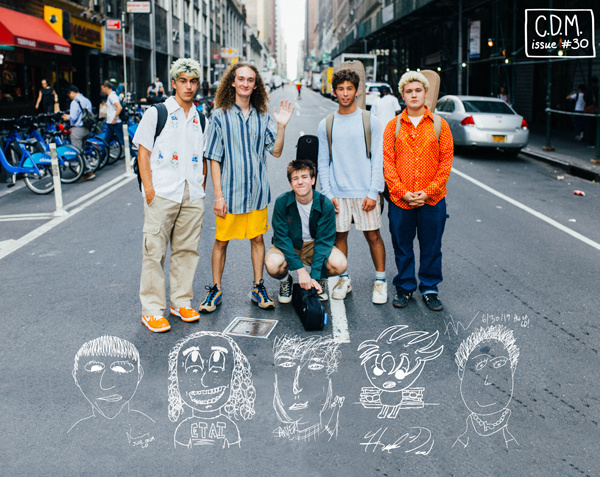

Two days after we first meet, I catch up with LAUNDRY DAY via phone call, on a high after the playing the first night of their All My Friends Tour in Washington DC. Sawyer is practically beaming throughout the conversation, sharing with me that, “We wanted to make [the songs] different from the last tour, and make them feel like a new live experience. We were anxious before the show, just because there were a lot of new transitions and moments we had planned out. The audience was super receptive, and it was nice to hear people say they loved all the new stuff.”
And even since that phone call, things have ramped up even more for the band, having been announced as opening for Clairo’s upcoming UK and Europe tour this December, as well as performing at Tyler, The Creator’s annual Camp Flog Gnaw. While they’re at it, they filmed, edited, and dropped a music video for ‘I Feel Good’ in Toronto, showing the boys jumping around with a total love for what they’re doing.
We hung out with LAUNDRY DAY on an afternoon in New York City last month, then spoke again with them on the road to discuss their friendship, songwriting as a group, and more…
...we speak, like, a secret language, we can all understand each other without even saying anything, but at the same time we are very different and we like very different things, just in terms of our taste in art and the ideas that we have. So I feel very lucky that we’re all very talented people, but the sum of our parts is much greater than what we could do by ourselves, and that’s why when we make music it’s all of us in the same room, we just shout out whatever idea we have and just go lay it down right away. It just makes for much better art, that none of us could’ve made on our own. All five of us are represented.
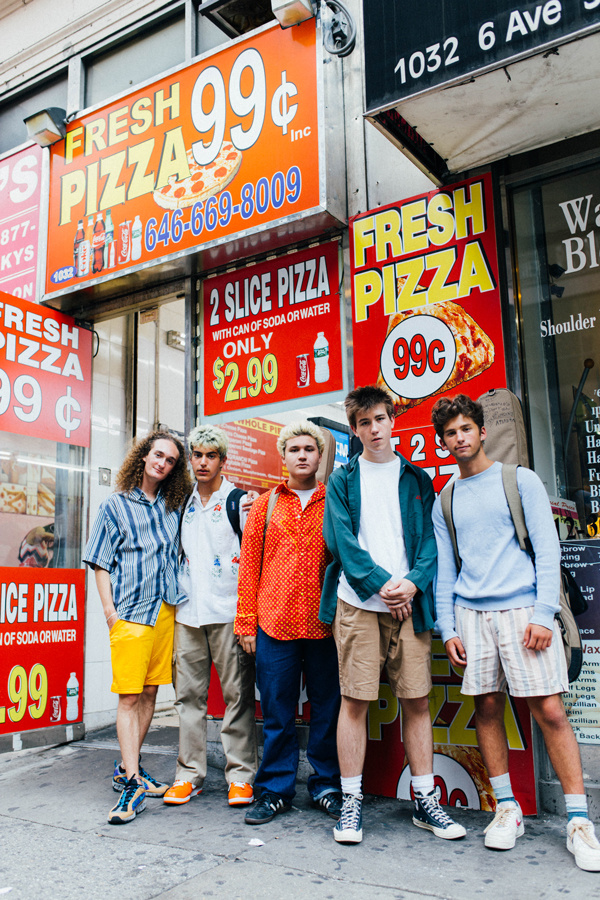
COUP DE MAIN: Firstly, some band history is required. Did you guys all grow up in New York? You all met in high school, correct?
SAWYER NUNES: These guys did. I’m from New Orleans, so I was born there and lived most of my life there, and listened to music and kind of got into music there until I was twelve, and then I moved to New York and started going to middle school, and still enjoy music, and then met these guys when we went to our high school.
CDM: You’re all the same age, and in the same year at school?
ETAI ABRAMOVICH: Yep. We’re all going to be seniors!
CDM: Jude, is your sister a musician too? Did you grow up in a musical family?
JUDE CIULLA: Yes, she is! In the same house with a lot of music, it was kind of destined that we would both be into it. Luckily we both got the genes, because my mum can’t sing for shit, but my dad can, so we got lucky. It was just always a part of our lives, there are tons of videos in our records of us singing together for our parents - we’d always do that together in the house. There’s one LAUNDRY DAY song that she’s on called ‘Little While’, and a lot of it these days is us playing each other stuff. We’re both working on new stuff, so it’s cool to exchange, and I get to talk to her about some insight that she might not have yet, just because she’s a little bit less experienced. It’s cool though, we go back and forth.
CDM: Etai, is Gibson your dog?
ETAI: Yes! Gibson is my dog, he’s like my little brother.
CDM: He should become the band mascot.
ETAI: You know what, I’m working on making that happen. He kind of already is.
CDM: Sawyer, you started on Broadway, right? How did that experience help you learn more about music and what you wanted to do with LAUNDRY DAY?
SAWYER: Yeah. I owe a lot of the way I sing, perform, and carry myself, to theatre. It gave me a lot of confidence, being able to stand on a stage and present yourself, say or sing what you have to say or sing, and that ability, and learning that has helped me so much with the live show. It’s just a little different now because I’m telling my own story, and singing my own words, so that was something I had to get used to. I think that they both influence each other really well - being on stage is a performance, you’re acting essentially, playing a role. Especially in a group, you have a role to play, so learning that and learning how to work in a team, you learn that when you know how to act - how to take cues from your other actors and how to build off the energy that they’re giving you, and it’s the same thing in the group. Jude will look at me and we’ll be feeding off each other’s energy. HW and I do that a lot in the set, we’re always locked in. I feel like that’s a really good skill to have, to be super comfortable, so all of that natural energy that you have can come out without any nerves. It’s taught me so much.
CDM: Is acting something you’re still interested in?
SAWYER: Yeah! I look up to people like Donald Glover and Quincy Jones, who are multi-talented and do a lot of things in their life. I feel like we’re all like that. It’s never been like, ‘We just want to make music and release albums,’ we all have so many interests that we want to pursue - whether it’s fashion, or film-making, or acting, or screenwriting, or scoring. I’m always interested in new things, so acting is still a big part of my life, and I love tapping into that. Just before we started tour, I was in London for a Shakespeare programme at RADA [Royal Academy of Dramatic Art] and I was telling the boys that that one week to get away and clear my head was so beneficial for me - just to dive into a completely different thing. You don’t realise how much doing other things influences the music; it was great. Just being able to meet new kids, be in a new city and experience that, it’s so beneficial, rather than just doing one thing all the time. That’s what I think makes the music so cool, we’re all individual and do different things, so when we all come together it’s like a really good smoothie; it has all these cool flavours.
CDM: I love that analogy!
SAWYER: I think HP came up with it. I don’t want to take full credit.
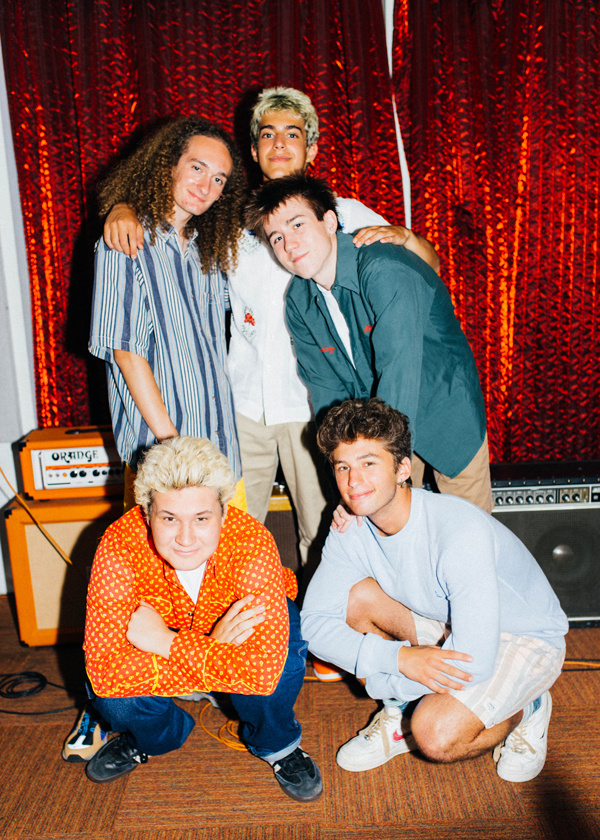
CDM: I love the line in '10 Speed' when you sing, “I like to say that I’m fine, when really I’m not all right / I say that too often.” Do you think that young people have a tendency to pretend they’re okay when they really aren’t?
SAWYER: That’s a great question. Yeah, I think that song for me at least, is about feeling trapped in whatever situation you’re in. Not even just physically, but I feel like nowadays, especially being a teenager and especially being in New York, and with social media and the way in which you present yourself online and that being different from who you really are, a lot of times you put on this front to say, ‘I’m fine, I’m having a great time,’ because that feels very safe and secure. You don’t want to be vulnerable and show people that actually, ‘I’m human and I have feelings, and I’m not okay all the time.’ For me, that song is about letting go of all of those things that we bottle up inside, just because we think they’re not cool or not socially acceptable, and saying that sometimes we do pretend like we’re okay, when really we need help - and reaching out and asking for help is not something that’s looked at as super cool a lot of the time, which I don’t think is great--
CDM: It’s cool to hear that in a song so people can be like, ‘Oh, other people feel the same as me.’
SAWYER: I like it, and that it’s one of my first lines on the record too - it sets up a precedent like, ‘This is something about myself that I’d like to change,’ and throughout the course of the album I think I dive into a bunch of different things that maybe are the reason why I like to say I’m fine when I’m not all right. When I started that verse I didn’t know where it was going to go, and Jude told me, he was like, "I want to know why you say that in the rest of the verse." I had written a bunch of different versions of it, but a lot of times that was a good thought and I just had to dive deeper into it. So that’s why I think that song is so special, because it starts with that line and then goes into why.
HENRY WEINGARTNER: The hook on ‘Camp’ is kind of the opposite, it’s like your answer to that.
SAWYER: It’s an interesting way to start in the middle of a story, and where I was right then.
CDM: Jude you sing, “I’m so scared of dyin’ / Got too many plans inside my mind.” Do you think that a fear of death is a universal sentiment?
JUDE: I think that people could relate to it. I have a lot of random lines that I think of or random thoughts that I want to get out on songs, and that was always one of them for a while, because that’s something that I think about and something that I thought other people would relate to. I think for some people death can be scary because they don’t know what happens after, and I think what I’m saying on the song is maybe a little bit different from what other people might think - which is like, ‘I don’t want to die because I have so many things that I want to do before then,’ I’m accepting that maybe there’s nothing after, and that I have to do as much as I can before that happens.
CDM: What did you mean by the line, “You can’t spend your life lookin’ for their eyes”?
JUDE: That line means don’t spend your time trying to get other people to see what you’re doing and recognise what you’re doing, you just have to do your own thing. That’s a re-occurring theme, I talk about eyes a lot on the album - whether it’s talking about a specific person, or just a metaphor for people watching you. So on another song when I say, ‘Messy eyes / all in the sky’ [on ‘Messy Eyes’], that was meant to be all these people watching over you and being a part of your life in a good or bad way.
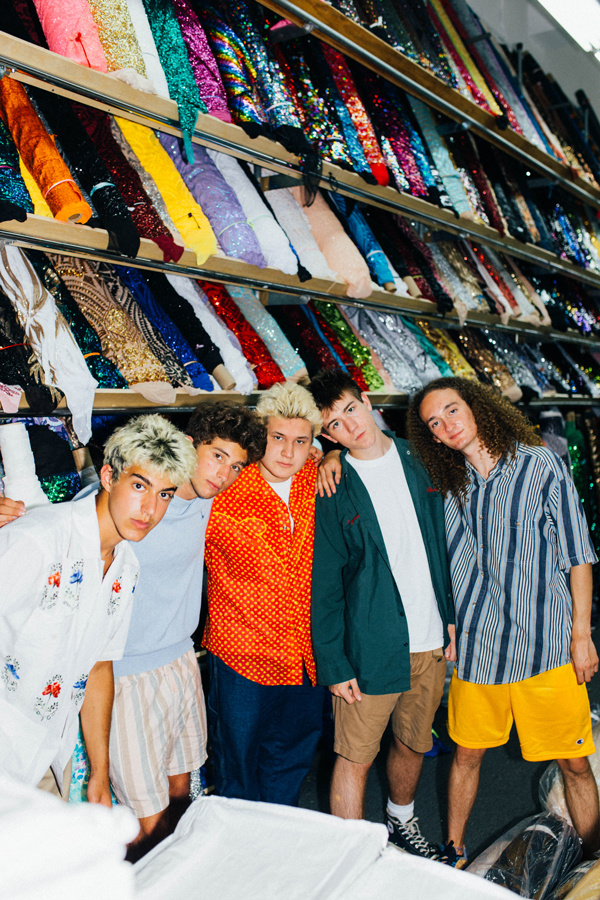
CDM: Jude, you tweeted: “I’d love to explain all my verses on HOMESICK to y’all at some point somehow.” Could we get you to talk a bit about one of your favourite verses on ‘HOMESICK’?
JUDE: Yes! The '10 Speed' one that we talked about is definitely one of my favourites. I think 'I Feel Good' means a lot to me - in my parts, that song is addressing an old friend of mine, and telling the story of our relationship and how we met and really hit it off, and then just being friends and doing all these fun things together, and then the second verse is kind of reflecting on where it is now, and what it was once like. I’m kind of talking about how we still hang out sometimes, but any time that we hang out we’re just talking about what it used to be, and reminiscing. In the verse I’m saying, “It's kinda awkward looking back on the days running track / We were so damn slow / Still kinda hard to run in circles again and again / We ain't kids no more,” so I’m sort of taking the metaphor of running around the track as going backwards and reminiscing, and it’s just tiring to talk about the old shit where we clearly can’t hold up a conversation about what’s happening now, and talking about how things change. A lot of ‘HOMESICK’ is about how things are changing in our lives more than ever, with everything that’s going on with the band, and dealing with that, and a big part of that is how it changes our old relationships - whether it’s with our family, or with old friends, and just dealing with that.
CDM: In ‘Harvard’ you say, "I’ll jump off the roof if you ever treat me like your puppet." Why do you think it’s so important to be unique and not controlled by anyone else?
JUDE: That’s a great question. I think that line was important because I think a lot of people will try to tell you what to do, but also have this perception of what’s normal - especially in music, you see a lot of people that just fall into this space of being controlled by management or their label. That’s what I was thinking about, I would rather die than have to be controlled by someone and not be able to move on my own.
CDM: It’s so cool that you guys make all your own decisions about the band as a group.
JUDE: Yeah, that’s what it’s about too! That whole song is just about, ‘We’re just trying to be free.’
SAWYER: It’s just about letting loose, I guess, which is different than some of the other songs on the album. That’s kind of the antithesis to the idea that we’re always being watched, and we have to put up these facades. It’s like, I can wear a Harvard sweatshirt and people will think that I’m so stuck-up and really smart and from this school, but I’m just having a blast - all these kinds of social precedents that we put on people, just getting rid of all that and being your truest self.
CDM: “Everybody wanna know who they’re gonna be / Take a leap and you’ll see we don’t need all the answers now,” Sawyer, you sing in ‘Blue’. Why do you think as teenagers it’s important to know that you don’t need to know all the answers?
SAWYER: I think it’s interesting. It’s harder now too, because everyone using social media seeing everybody’s online self, it seems like everybody knows what they’re doing - they’re out living their greatest life, they’re going on trips all over the world, they know who they’re going to be. I think it’s something that everybody struggles with. Especially being teenagers, you don’t know what’s coming next - I don’t know what the next two years are going to hold for us as a band, but you have to find comfort in that. I think that’s what’ll make you happy, you can’t base your happiness in what’s going to happen down the road or else you’re never going to be happy, it’s all about loving where you are in the moment. That’s something that I feel like I wanted to express in that song, it’s such a feel-good moment on the album, and I just felt like right now, where we are, if it all ends tomorrow, I’ll be so happy with the work that we’ve done. I feel like we’re not working towards Madison Square Garden or arena tours - obviously we hope to get there one day, but you have to love where you are right now, and that’s the key to happiness I think. When you stop and admire what’s going on, you’ll find so many really cool moments - being present, and open, and meeting new people, has opened up so many doors for us, that if we’d been so focused on, "We have to be working on this new music to come out right after ‘Homesick’ so we can go play a big tour," I feel like so many of these magical moments wouldn’t have happened. You have to be open to living your life and going with the flow.
CDM: How did you guys recording at Rick Rubin’s Shangri-La studio come about?
SAWYER: We have two managers, we have JJ and we have [Michael] Goldberg; his best friend who works at American Publishing - which is kind of Rick Rubin’s company and Shangri-La is Rick’s studio. We had heard about the studio before - I was a big fan of it, I knew all the history of it. We were coming out to LA, and we wanted to find time away from school just to have a weekend and work. We were also working with Romil [Hemnani] from Brockhampton that weekend - he was either going to come to New York or we were going to go out to LA because we wanted to find time to work on the album with him - and it just so happened that the studio was free. Rick was out of town, and Goldberg said, "If you guys want to use the studio, I’m really close with Rick and of course we can make that happen." We all freaked out, and it was such a beautiful thing because it never felt like we had to push for something like that, it was like the stars aligned and it happened, so it was a really magical moment. It felt so quick and so meant to be.
ETAI: It was also really cool because before that we had recorded every piece of music ever in our bedrooms - that was our first studio ever. Our engineers were there 24 hours, we were really lucky to have that, and it just felt like it was our new home - we were just relaxing, it was a huge property, and we could do whatever we wanted. For the first time we were pressed for time because we had two days to make the best art we could, but it didn’t feel like that at all.
CDM: I loved that Tyler, The Creator story you told Pigeons & Planes as well, it was great.
JUDE: That was the second time we went, we were lucky enough to be able to go back. That was in April, after ‘HOMESICK’ was released.
CDM: So that was for working on new music?
JUDE: Yeah, that was actually the first time we worked on new music since the album.
SAWYER: It’s such a special space for us, because rarely do you get an opportunity to turn everything off from the outside world. You realise how much you do in a day - you’re always on your phone, you’re always hanging out with other people, and so we were really lucky to have the opportunity to go out there and be our true selves with no outside distractions.
CDM: I guess when you’re working at home you can get distracted by things easily.
SAWYER: Yeah, we go out to eat. You can feel the energy there too, a lot of people have been there.
HENRY PEARL [HP]: It feels a lot like summer camp - you put your phone away in another room so there are no distractions, and you’re just doing what you’re supposed to do. You have your schedule and it’s not that complicated, you just go and you make music, and it’s fun.
ETAI: It was also a great place to do the last 15-20% of the album because having done everything in our bedrooms before in New York, it was great to just change the environment. Stuff got pulled out of us that we didn’t think was there.
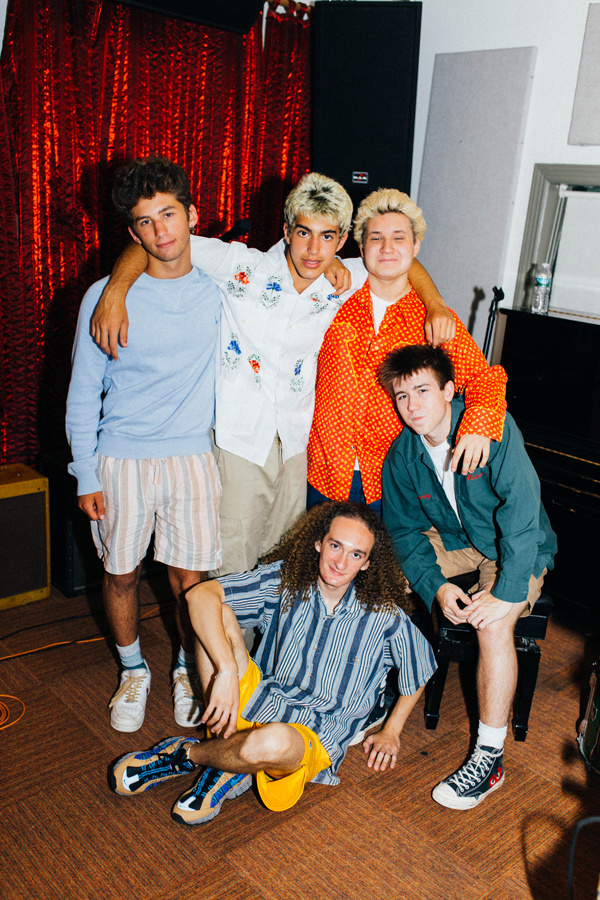
CDM: ‘Messy Eyes’ is way more stripped back for a Laundry Day song. How did you find working on that song? Originally it had a beat in it, right? In your documentary you can hear an earlier version of it.
JUDE: We actually took the drums out, maybe ten minutes after that shot - we just put that in the documentary. Very soon after that we were quick to be like, ‘I don’t think drums work for this,’ so we had taken out the drums before we left Shangri-La and when we came back to New York we ended up re-recording the entire song - it still had no drums but we just changed up the arrangement a little bit.
ETAI: How that song came about, I had these guitar chords and Jude had this melody that we knew we wanted to use but we didn’t know what to do with it. We had the idea when we got to Shangri-La that we wanted to do something with it but we didn’t know what. It was at one point in the evening, it was the second day right before we left, me, Jude and Romil were sitting in the room and I was playing the chords and it was cool just watching him because he got so stuck on every chord and tweaking things, and we all got so excited when we got to the right progression and it ended up working out.
JUDE: We were just jamming on it and then Romil walked in and I got to the "sha nah nah" bit and he was like, "That’s so sick!"
ETAI: It was cool because we weren’t expecting him [Romil] to collaborate with us like that. Obviously he’s an incredible producer and beatmaker, but I thought the best part was him sitting there and telling us what he liked - because it’s always just the five of us giving feedback to each other, which is great and we’ve made great songs because of it, but getting fresh airs is just different.
SAWYER: That’s the cool thing about ‘Messy Eyes’, it started in Etai’s basement, just the five of us. Then we took it to Shangri-La and added a bunch of really sparkly, pretty stuff to it, and Romil was helping, and Rob [Bisel] was helping. It was a really beautiful thing that we re-recorded at my house, in my bedroom; at the place where it all started again, and it came full circle. Also, it’s such a special song to record and to write, and it felt really comfortable to do it in our bedroom with no one else watching, so that was nice to tweak it like that.
ETAI: I feel like it shows up like that on the album too - it’s right in the middle of the album, much more stripped back than everything else, and it’s like a breath of coming back to basics.
CDM: So much of your music deals with growing up as teenagers. Why do you think that the years of growing up and high school are so particularly hard to deal with, or have a more intense emotional toll?
HP: My parents tell me this all the time - I think it’s because we’re changing so much, and it’s hard for our parents and it’s hard for friends sometimes. You notice that people change really rapidly and you just have to adjust and be okay with that.
CDM: Jude, you talked about not wanting to sit on a project because as teenagers things change so much that it’s hard for it to evoke the same emotion after time has passed. How do you feel about ‘HOMESICK’ now, having released it four months ago?
JUDE: It’s funny, I think a lot of it is still relevant to me personally - what I was writing about was a little bit more existential in the sense that it wasn’t about something that was going on, but more about stuff that I’ve been thinking about for a while, and questions that I still haven’t had answered - as opposed to on past songs addressing a certain person that maybe isn’t as much a part of my life now. So when it comes to ‘HOMESICK’ a lot of it is still relevant.
CDM: Which song on ‘HOMESICK’ means the most to you?
HP: They all mean a lot to me, so it’s a hard question. I think ‘I Feel Good’ means the most to me because it tells a story that I relate to so extremely. It’s not something that happened to me once, it’s something that I notice once a week or once a month happening again, so having that song to look at and reflect on can make me more sad and more aware of things going on. It’s more tangible because there’s a song so specifically about that feeling of losing touch with the people that you used to be close with.
HENRY W: At the moment, since we’re on tour, maybe ‘FRIENDS’, because that kind of details the story of how we became a group, and what it means to all of us. So we’re living in that right now. That’s my answer for right now.

CDM: When you’re performing songs like ‘I Feel Good’ which have such emotional and relatable feelings, do the emotions and feelings run through your mind?
HP: 100%. When I’m performing, I’m keeping in time, but I’m really just listening to the lyrics, always. That’s just my favourite part of any song really, so I definitely am thinking about what the song is about. In Washington, someone nearly started crying during ‘Messy Eyes’, and I was like, ‘Damn, I have things to cry about too.’
CDM: Do you have a favourite song that you’re performing live at the moment?
ETAI: For ‘CHA’ and ‘I Feel Good’, we’re doing new versions of both of them. We used to play those songs a little slower, it used to sound cool and like the record, but now we’ve switched them up and made them sound a lot more energetic. They’re some of my favourite things to play, even just after that one show, you could just feel the room light up when that goes on, it’s so sick.
CDM: It must be cool to have a different version compared to the record.
ETAI: We pushed for that a lot. When I go to shows, that’s my favourite thing, especially for bands whom I know their record really well, I’d rather them not do the same thing that I already know - it feels a little too easy.
CDM: What was it about ‘FRIENDS’ that made you all want to record your vocals together for the “we got so caught up” line? It’s such a nice way to end the album!
JUDE: We’ve done that a bunch of times actually, all singing together and then duplicating it to sound like a choir. At Shangri-La we decided to do it again, and it definitely ended up sounding the best it ever had. We did it on ‘Harvard’ too in Sawyer’s room, and on ‘Evening News’ too - on a lot of songs.
SAWYER: It’s a nice way to have everyone’s voice be a part of it. Our individual voices are cool, and our individual voices as instruments are really cool, but when we all come together and sing something, everybody’s different voice and style comes through - it’s a nice way to end the album and feel whole and lovey.
CDM: You guys have such equal input into Laundry Day which is also really cool to see. Why do you think it’s so important to trust each other, and all share your thoughts when working on music?
ETAI: It’s very important to us that we have equal input and that we’re all on the same page about everything. I think it’s really important because we’re all very similar - we speak, like, a secret language, we can all understand each other without even saying anything, but at the same time we are very different and we like very different things, just in terms of our taste in art and the ideas that we have. So I feel very lucky that we’re all very talented people, but the sum of our parts is much greater than what we could do by ourselves, and that’s why when we make music it’s all of us in the same room, we just shout out whatever idea we have and just go lay it down right away. It just makes for much better art, that none of us could’ve made on our own. Like, all five of us are represented.
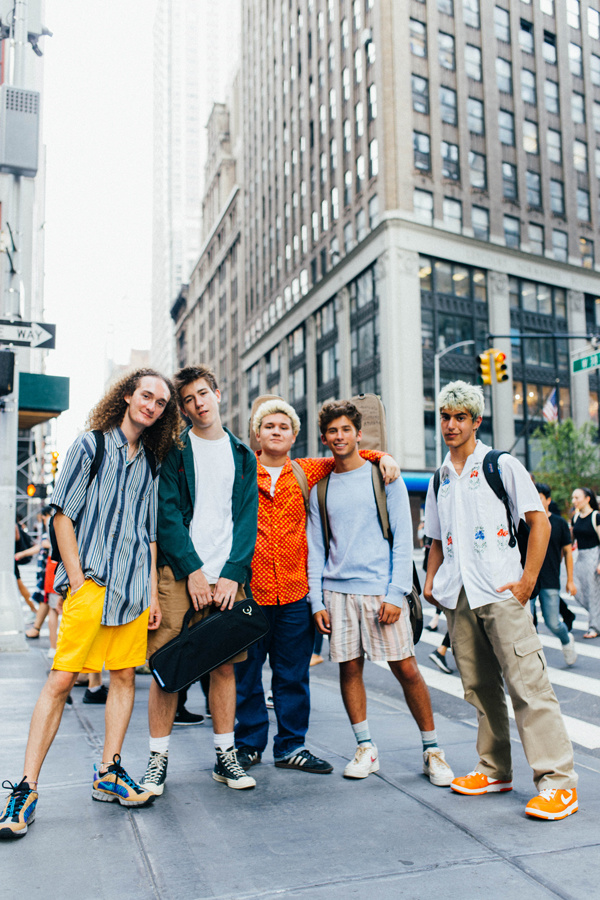
CDM: Do you ever get writer’s block working on music?
ETAI: It happens all the time. I’d say when we were making ‘HOMESICK’, about 40% of the time when we went to record and we did something, it was either not very good or we weren’t feeling it. We take breaks a lot, and a great part about it is that when we’re not making music, we’re just hanging out together. When we don’t feel like recording and we aren’t getting a bunch of ideas we just go do something else, and usually we can come back later or the next day with a clear head and we’ll have more ideas. We’ve found that it really sucks when you try to force that, and it doesn’t create things that you want to put on record - you know what I mean? It’s better to wait for those moments to come. The times when they don’t come, just go do something fun. I care a lot about making great memories with these guys, as much as I care about making great art, and I feel like without making memories and doing cool shit, you can’t make the music that you want to make.
CDM: Sawyer, how did Quincy Jones videos teach you how to produce music?
SAWYER: That’s really interesting. I remember when I was younger, watching him score a movie - he was in the studio and he was writing the string parts to this movie, and I was just watching him and the way he was talking to his engineer, and that language was so new to me. It was like learning another language, and I was like, ‘Oh, what does that mean? I have to figure everything out.’ So just watching him in the studio and watching him do what he does was like watching a magician. It made me want to understand what he was doing and what he was working with. He was never just one thing, which I think is so important nowadays, he was so multi-talented, and picked up things later in life that he got so good at. When he first started, I don’t think he was ever thinking that he would produce for all these incredible people, or write for movies, or all this crazy stuff, but he just learned and adapted along the way, and that’s something I really admire about him.
CDM: It was really cool to see your musical process in the ‘TOGETHER FOREVER’ documentary you put out. Why do you find it important to document and share that process?
JUDE: I think we went into this album with a big goal of wanting to film more. We’ve seen documentaries about albums being made and we just love watching them, we know how cool it is to see certain ideas just come into play in real time, or songs sounding different as they do on the final version. So we wanted to capture that. It was super fun for us to watch it, and for me to edit it, and to see things - even though it was a six month process - like the very early stages of songs, and look back on things that you might not even remember happening. So it was cool to capture that for ourselves, and also we know that it’s fun to see it, so we wanted to share it with everyone.
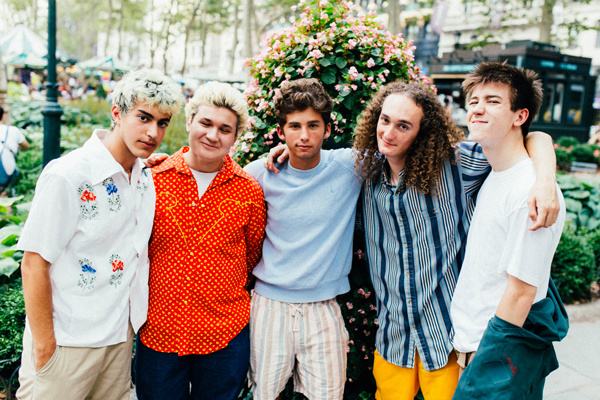
CDM: HP, I wanted to quote you from the documentary: “I love creating, but I’m a businessman.” Before you guys had a manager, did you have to learn yourselves about the business side of the music industry?
HP: <laughs> That’s a good question. There were a lot of small things that we had to take care of - like making the website and booking shows, but I think that once we got a manager we started to learn way more. He knew a lot more than us, and we got to watch him market us and do his thing. Before that happened, we were definitely taking care of everything we knew about, but there were just whole worlds that we didn’t know about.
CDM: Sawyer, in ‘I Feel Good’ you say, “Fighting with demons / I’m dealing with all on my own." Do you find songwriting a good outlet to explore those different emotions that you’re dealing with?
SAWYER: It is my outlet, for me. I feel like a lot of times I don’t know who I would be without music and I don’t know who I’d be without the ability to make music. It’s definitely an outlet for me, and especially meeting these guys too, just being able to collaborate with your best friends and have that space to truly express yourself. There are so many projects and songs on my computer that will never see the light of day, but just the ability to get that out and write something about it has just saved me from-- You never know where that energy and nervousness can go, and I feel bad for people who don’t have something like an outlet to put their thoughts and emotions into, because it’s helped me in a lot of really difficult situations with friends or relationships. Or, just as you said, we’re always changing, so the ability to document that and go back and look at that is so special. Without it, I don’t know who I’d be. It’s kind of all I really know how to do.
HP: Making music can be pretty intimidating, so you don’t have to be writing a song to be able to get those feelings out too - there are other ways to do it that take a little less effort, you can just put your pen on paper and start writing, and you can learn a lot by yourself.
ETAI: One more thing, like Henry said, this is the age where we’re growing so much, but it’s also the age where I feel like kids are the most discouraged from trying things and doing weird shit and being themselves. Journaling, or making songs, whatever it is, just do it, and see how it feels! You’ll never know how it feels if you don’t just do it.
CDM: HP, you tweeted in May “I’m so proud of my generation and I believe in every single one of us to change the world.” Do you think it’s important for your generation to believe that they are able to make change in the world?
HP: It 100% is. Groups are made up of individuals, and every large change starts with one person believing in something and being passionate. Also, I think if you don’t have anything you’re passionate about and willing to stand up for, then you’re not being productive - it’s like the equivalent of being a couch potato on a global scale. You don’t have to expect giant change from just you, it’s all about the little things and just making small changes in the way you live, what you talk about and how you speak about things, and who you choose to speak to.
CDM: What type of things do you personally want to help change in the world?
HP: I strongly dislike a lot of culture and the way people speak about other people and to each other - like using the word 'gay' as an insult, or misgendering people on purpose. Those are two things that bother me specifically.
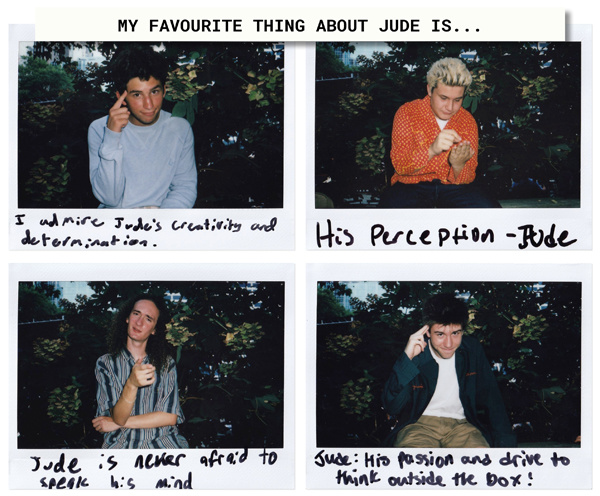
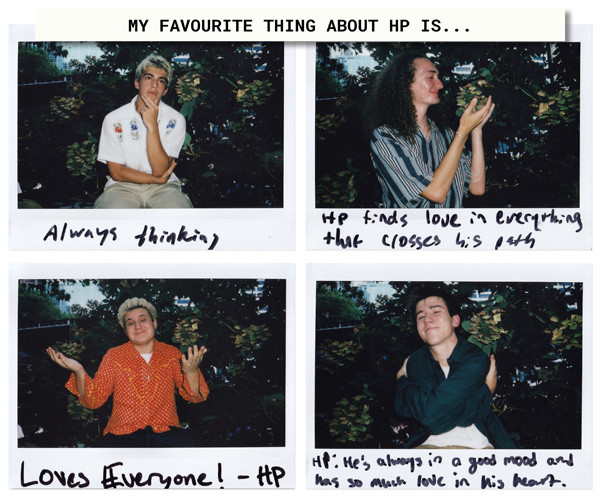
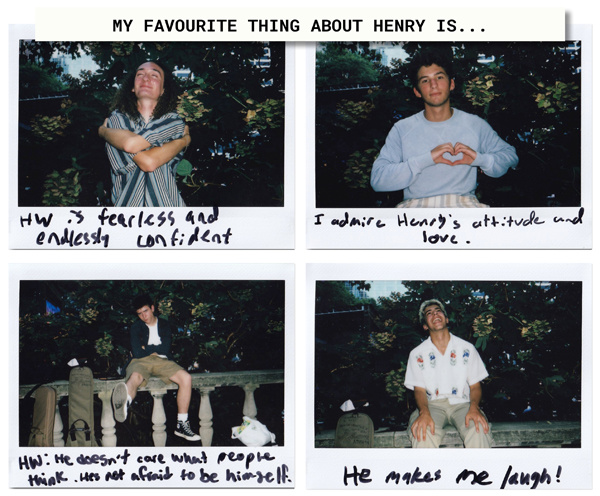
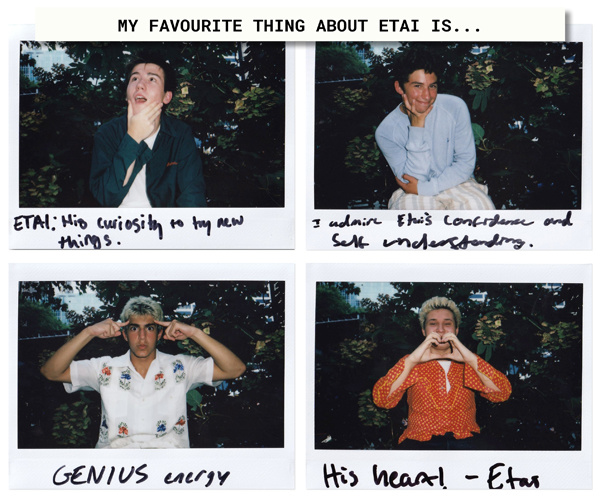
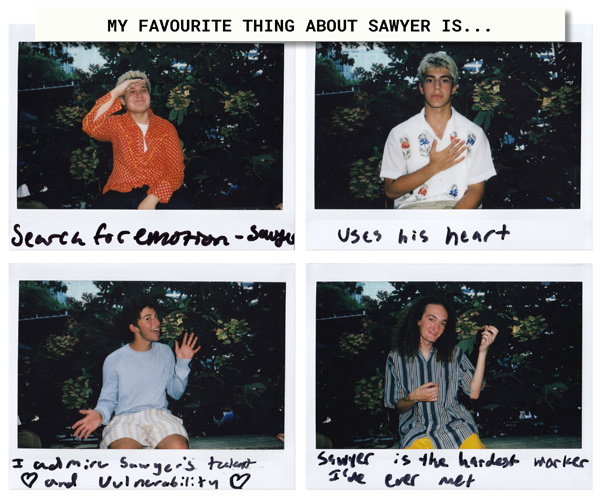
CDM: We saw that Clairo said working with you guys was inspiring! How did you find working with her?
ETAI: It was so sick. That was actually the second studio we ever went to. It was in New York, and it was cool, we were with Claire, and with our two friends Jimmy and Harry from NYU who we work with a lot. That was such a fun day because since ‘HOMESICK’ came out we’ve been making so many songs, not really with a project in mind, but to exercise the muscle and get better at it, and as Sawyer said, to get shit off our chest. Whenever you get someone new in the room, it changes it and makes it so much more interesting, and Claire just had so much to add.
SAWYER: She’s so open, especially in a studio setting, she’s always willing to try a bunch of stuff. She was playing guitar on a bunch of songs and singing - she’s just a good vibe and it’s nice when someone really clicks in. We work in weird ways, we work very fast, and we’re kind of hyper and all over the place, and I feel like she added a new spice to it.
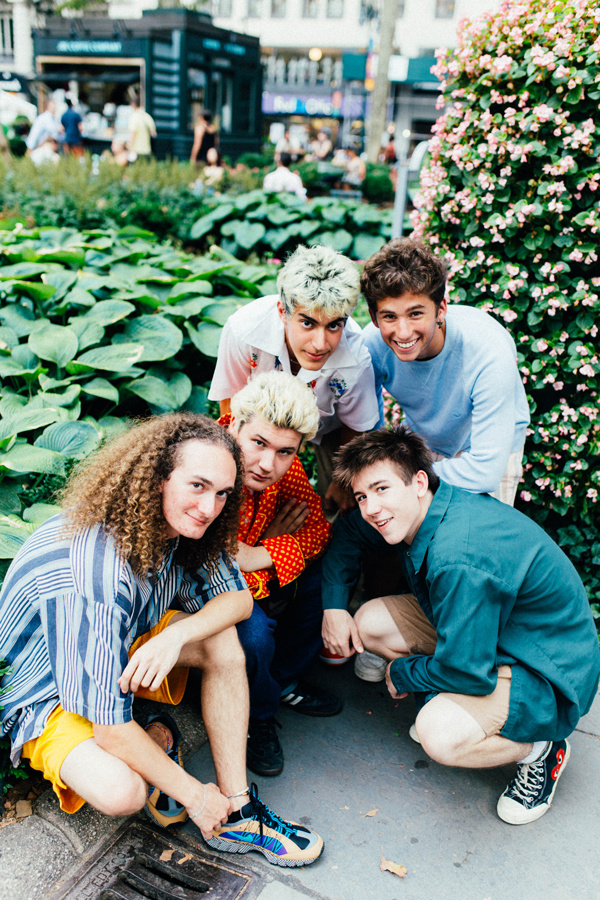
CDM: Jude, what did you learn from Jim Henson’s book? You said it changed your life.
JUDE: Oh, yeah, thank you for asking about that. I learned a ton - it was really cool to read about different creatives and how their minds work, and how they grew up. Jim Henson was super cool because he was just always thinking of new ideas and always working on a bunch of projects at once and it made me realise - going back to the last question - that there’s no point in sitting on a project or sitting on an idea. If you have something, capitalise off that spark and just go for it, even if you’re juggling a bunch of stuff. There’s something beautiful about how he just thought of an idea and started working on it right away, and didn’t let it go away.
CDM: What is the importance of “geesifer” to Laundry Day?
HENRY W: We’re trying to cut down! We used to use it a lot. We were in a diner one time after we had played a really good show, and Jude came up with the word. We started using it an absurd amount, and we kind of forced it upon our fans, so it became a bit of a trend thing. I think it’s still in my Twitter bio. It was so funny for a couple of months, everybody was a geesifer - it unified people in a way. Now we’re trying to cut down.
CDM: You need to find a new word to use instead.
HENRY W: That’s true. We’ve been saying situation a lot. Like, "This is a situation."
CDM: Etai, who has been your favourite special guest on John Mayer’s 'Current Mood' show?
ETAI: Have you seen the one where Dave Chapelle and Daniel Caesar are on it and get into a huge argument?
CDM: Yes…
ETAI: That was my favourite, by far. That was just hilarious to watch, knowing it was live and they couldn’t do anything just made it even better. It was ridiculous. He was just trying to clean up the situation and neither one of them were having it. Thank you for asking me that question! Did you see that he’s doing it on tour? He’s live-streaming it to the arena.
CDM: And what has Laundry Day been working on recently, music-wise?
HENRY W: We always are making demos constantly. The day after ‘HOMESICK’ was released, we made a demo. It’s not like we take a break from making music after a project is released. It’s very casual as of right now - we might start thinking about where the future is going to lead us very soon, but we’re still making a lot of music.
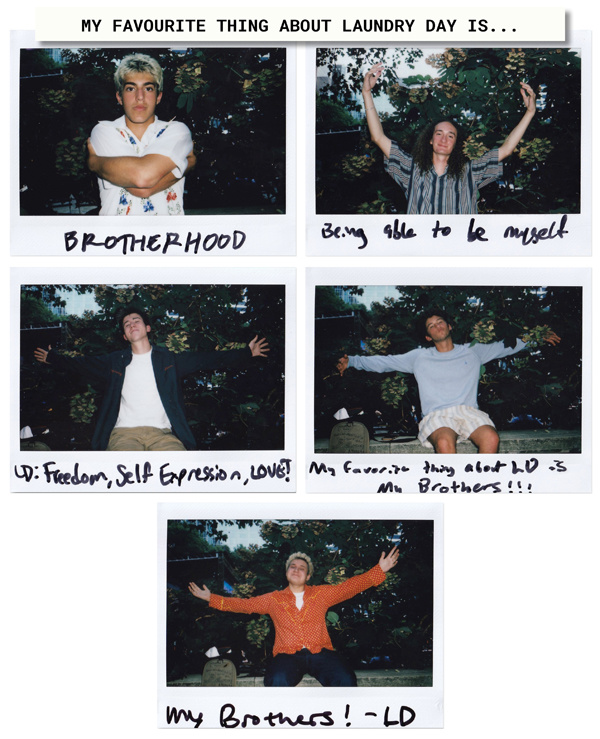
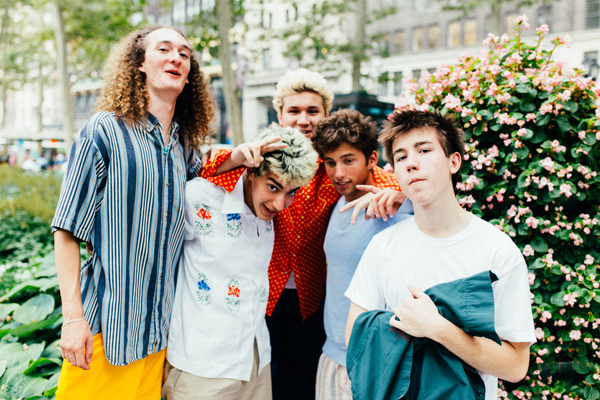
Laundry Day’s ‘HOMESICK’ album is out now - click here to purchase and watch their ‘I Feel Good’ music video below:

